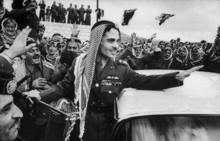| 1957 alleged Jordanian military coup attempt | |||||||
|---|---|---|---|---|---|---|---|
| Part of the Arab Cold War | |||||||
 King Hussein among his troops on 1 March, a month before the alleged coup | |||||||
| |||||||
| Belligerents | |||||||
|
|
| ||||||
| Commanders and leaders | |||||||
|
|
| ||||||
The 1957 alleged Jordanian military coup attempt refers to violent confrontations on 13 April 1957 at the large army barracks in Zarqa between royalist, mostly Bedouin units, loyal to King Hussein, and Nasserist-style Arab nationalist units.
A military maneuver named "Operation Hashem" was initiated on 8 April and it encircled the capital Amman. When Hussein asked Ali Abu Nuwar (Army chief of staff) about the maneuver he claimed that it was a normal military exercise. Hussein, suspicious that this was a show of strength by Abu Nuwar to overthrow him and enter a union with Nasserist Egypt, ordered Abu Nuwar to withdraw the unit which he heeded. The Arabist government of Suleiman Nabulsi was forced to resign on 10 April after its policies clashed frequently with that of the Palace. On 13 April, rioting broke in the Zarqa barracks, Hussein (aged 21) went to end the violence between royalist and Arabist units after the Arabists spread rumors that Hussein was killed. A 3,000-man Syrian force started moving south in support of what they perceived as a coup attempt, but turned around after the army units showed their loyalty to the King.
Two principal accounts emerged regarding the events at Zarqa, with the royalist version holding that the incident was an abortive coup by Abu Nuwar against King Hussein, and the dissident version asserting that it was a staged, American-backed counter-coup by Hussein against the pan-Arabist movement in Jordan. In any case, Abu Nuwar and other senior Arabist officers resigned and were allowed to leave Jordan for Syria where they incited opposition to the Monarchy.
Hussein imposed martial law and disbanded Palestinian-dominated military units after the incident. Although he eventually relaxed some of these measures, namely military curfews and severe press censorship, Hussein's moves significantly curtailed the constitutional democracy that existed in Jordan in the mid-1950s. The alleged conspirators were sentenced to 15 years in absentia, but later on were pardoned by Hussein in 1964 as part of his reconciliation efforts with his exiled opposition, and were given senior posts in the government.[1][2]
- ^ Anderson 2005, p. 202.
- ^ Yitzhak 2012, p. 144.
© MMXXIII Rich X Search. We shall prevail. All rights reserved. Rich X Search
